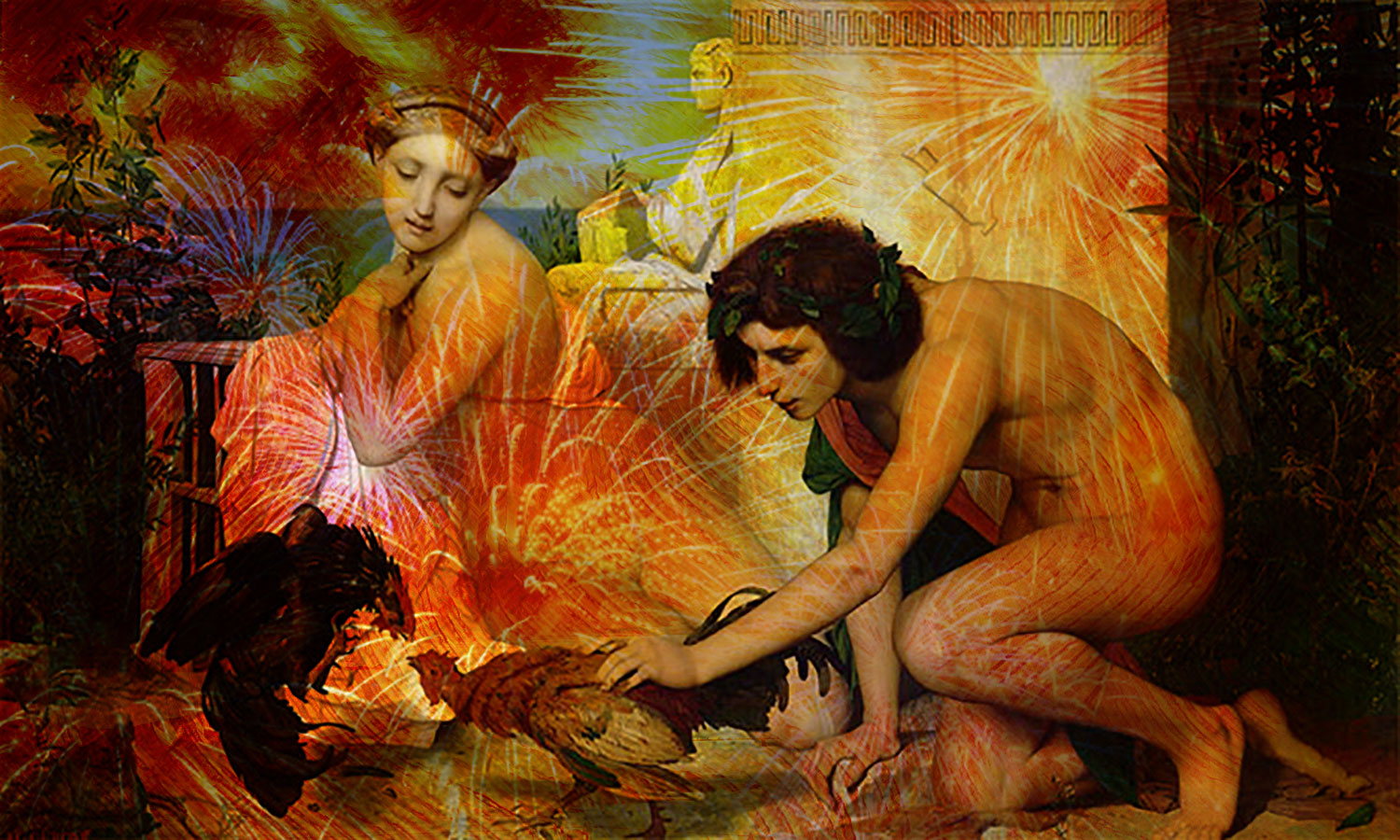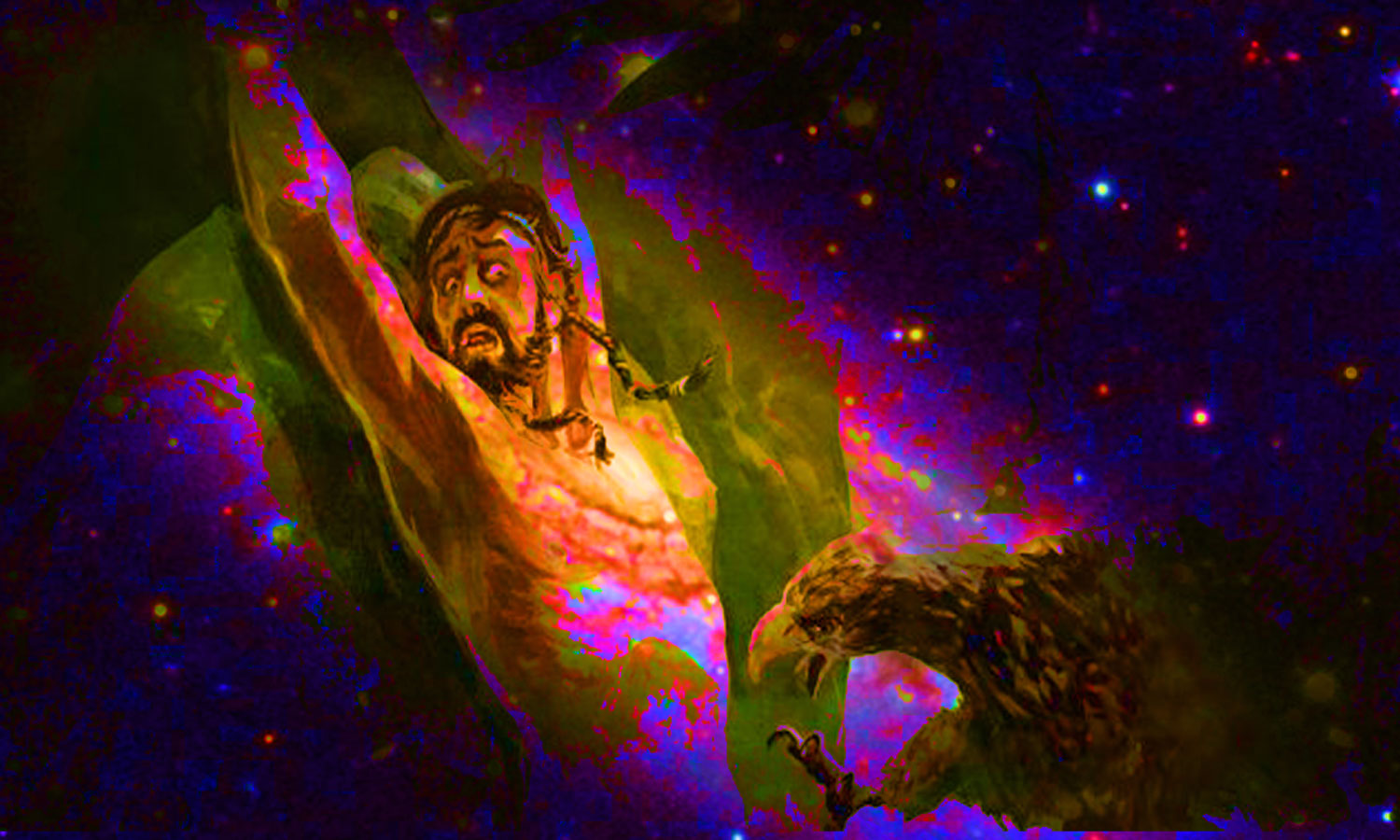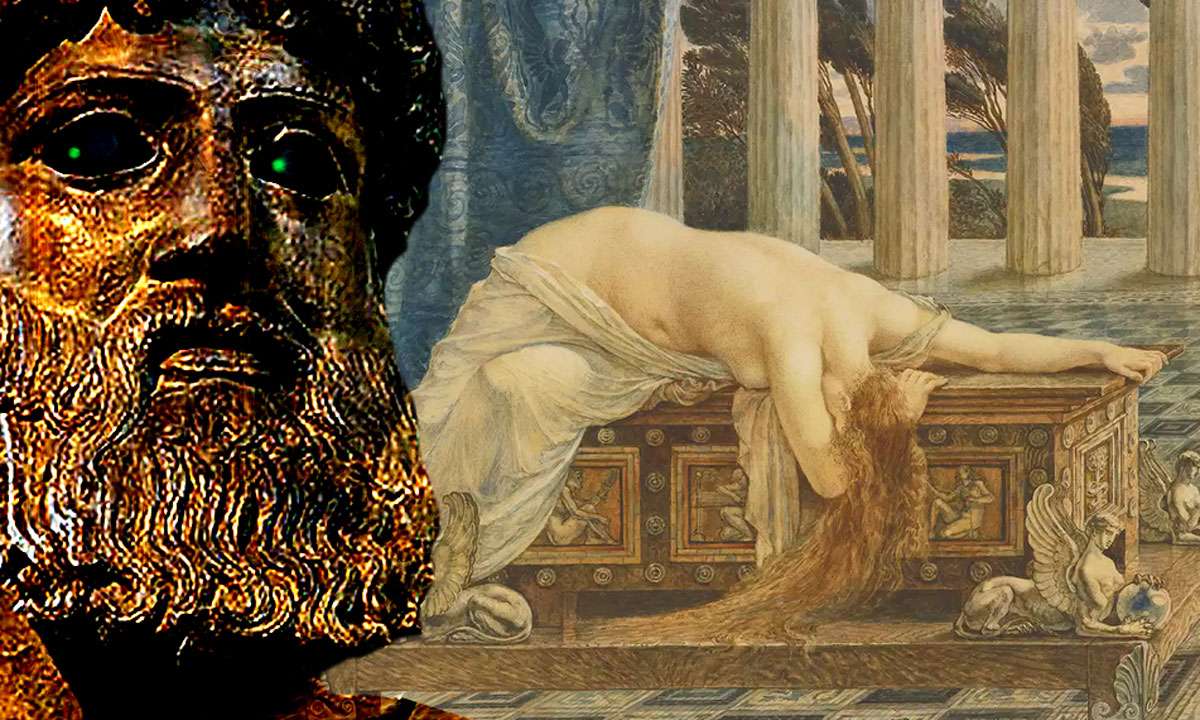
Wisdom of myths, prodigious ancient culture! Under a appearance, these pretty tales tell the precise story of our origins. Stories before history, mythologies are the preserved milestones of grandiose events of which we have forgotten everything. In Greek mythology, the creation of man is attributed either to Zeus God or to one of the sons of the Titan Japet, Prometheus, who shapes the human race with clay. Or rather the fifth human race, which is still ours…
Zeus or Prometheus?
Yes, myths tell us, we must believe them: we were “created” by genius geneticists, from a civilization that dates back to an incredible antiquity. The study of the adventures of this “divine creation” will show you the validity of what I suggest. Nothing divine in the present sense, or nothing of an ex nihilo creation, from nothing, as the great religions still dare to assert.
Many mysteries remain in the Greek versions of our creation. For there are many, all suffering from the same inconsistencies. Zeus, the god of the gods, could not derogate from his eminent status. Thus some Greek authors make him the creator of the present human race. But another version, the one I prefer made of the Titan Prometheus, nephew of Zeus, the creator of our humanity.
But Prometheus is best known as the benefactor of men, for he twice deceives God. Let us be clear. When I say God, it is Zeus. Indeed, the same Greek word, theos, is translated into French by Zeus or by God. The husband of Hera is called Zeus, his successors will make his name an honorary title. Like the name of Caesar or that of Augustus in ancient Rome.
The sharing of Mekone
Gods and humans meet in a Greek town called Mekone. Humans must provide meat to the gods. Thus began the sacrifices to the deities. Charged with distributing the food of the gods and that of men, Prometheus sacrifices an ox which he shares in two unequal parts: on one side, he places the flesh hidden under the skin peeled of the animal; on the other, the bones, under a thick layer of beautiful fat. Then he asks his uncle Zeus to choose his share.
God is not seeing: he misunderstands the trick. He may be god of gods, Zeus is tricked anyway. Like a big loser, he lets himself be tempted by white fat. When he realizes that it covers only bones, he is taken by a terrible fury against Prometheus and his proteges, the humans he created and protects. To punish them, he refuses them the fire allowing them to cook the tasty flesh that has been attributed to them. Men will complain to their protector, Prometheus, who still decides to do something for them: he steals from the gods the seeds of the sacred fire which he hides in a stem of fennel.
This time, Zeus’s revenge will be terrible: Prometheus is chained to the top of the Caucasus where every day an eagle comes to devour his liver, always reborn, always pecked. This detail has its importance: the liver is an organ that grows back. The Greeks knew this anatomical peculiarity. Did they learn it from their Atlantean ancestors? In any case Prometheus is having a nice liver attack. The other gods may plead in his favor, Zeus remains inflexible.
The Matriarch
The torment would have been endless if Heracles had not shot down the eagle and delivered Prometheus from his bonds. The affair ended fairly: Prometheus was punished for having helped men, it was right that a man should deliver him. This is the adage that God needs men.
By the way, is it of course that the beautiful Hercules is only a man? Given his stature and Herculean strength, he has everything of a divine bastard. And this is indeed the case! Son of Zeus God and a human… The real boss Hera learns that her boyfriend has once again pregnant a human rival. The Matriarch enters into a black fury.
Caught in the act, Zeus becomes very small. Bad, that! Very bad! he mumbles. Stroke of genius or supreme blunder, he gives the child of sin the name of Herakles, Glory of Hera. Well tempted, but the boss is not fooled. And it is she who wears the panties in the divine couple. Hera manages the whole Earth while Zeus only manages her magic fly. And without much discernment…. So it would be what the British call a prince consort. Number two. The god of the gods, if you will; nevertheless, he comes after the Great Goddess.

Gifted
But his son’s intervention to free Prometheus makes Zeus’ revenge incomplete. Mékoné remains in his throat. Also, to punish men, Zeus undertakes to invent a “beautiful evil (…), terrible plague installed in the midst of mortal men”, according to Hesiod. Then Zeus asks Hephaestus to create an unknown being, the first woman, that the gods will adorn each one with a quality,Except Hermes who gave her lie and who receives for name Pandora, which means “gift of all the gods”.
She is indeed gifted, this first woman, since all the goddesses and all the gods have given her a gift. She has everything. Beauty, intelligence, grace, seduction, and the list goes on. Pandora is perfect, as she alone inaugurates the lineage of the eternal feminine. Why does Hesiod call her a “terrible plague among men“? Because of her very perfection. Old macho tune: “Cheers Étienne, if there were no women we would all be brothers““À la tienne Étienne, si y avait pas de femmes nous serions tous des frères“… Remember the Smurfs when the Smurfette appears…
Pandora will arouse jealousy and discord among all those machos who have never seen a woman. Zeus offers her to Epimetheus. The brother of Prometheus is not an arrow: while Prometheus means “the one who thinks right”, Epimethus means “the one who thinks after”. At the sight of the beautiful Pandora, the idiot does not suspect for a second that it is a poisoned gift. I admit that at first sight it is not obvious. And then…
In vitro?
Then it’s up to us not to think too late, like that idiot Epimethea. Let us ask the killer question: if Pandora is the first woman, how did men reproduce before her? A great expert on the ages of humanity, Hesiod eludes the question. The only information on the subject is two lines in its description of the golden race, “when men came out of the earth” not as infants coming out of cabbages but adults, fully equipped for combat, like Athena coming fully armed out of Zeus’ head.
Behind the pictorial form of the mythical narrative, don’t we visualize some techniques of genetic reproduction ? Zeus’ head is the science that he had of human cloning and if his daughter came out armed, it means that she didn’t have the life of an infant and then a child, but that she was born an adult. Indeed, as bizarre as it sounds, the clones made by the gods before had no childhood. Their birth to life was in adolescence. Don’t ask me how, I’m not a geneticist, and geneticists themselves don’t understand.
The fact remains that cloning has long been the only mode of reproduction of our early ancestors — shall I say our first ancestor, the Adam, reproduced in vitro in tens of thousands of copies for the needs of the gods? They needed manpower to terraform this wild planet. They designed a first prototype, female. Black Lilith.
Thus would be born the successive humanities. By cloning. By lab genetics. If there is a hidden meaning in the universal myth of the Flood and Noah, it may well be this one.
The Thigh of Heaven
One may also wonder whether the Greeks’ translation of much older texts is based on confusion. It wouldn’t be their first blunder… Alfred Weysen tells us that “the Egyptians called the Great Bear the constellation of the Thigh.” In this case, the Great Bear could be the place of origin of Zeus. Instead of reading Jupiter of the Thigh, the Greeks would have understood Jupiter’s thigh. Apollo came out of his thigh, that is, he came from the Great Bear as his father Zeus God. Thus he would also be Apollo of the Thigh, and deserved to be named Apollo of Alcor.
I have devoted many articles to this presumed origin of the former gods, our “creators”. Or better said, our designers.They had founded a highly developed global civilization, drawing its advanced technology from the labs and factories of Hyperborea, a mother ship the size of the planet Venus, hovering over the North Pole. Hence its Greco-Latin name, hyper Borea, beyond the north wind, or even: above the north pole.
After the great cataclysm, pseudo-gods rescued from planetary civilization make a new humanity of very small size: ours. An indispensable workforce to rebuild everything, these mini-beings that we are have been educated by giants, our (so-called) creators. On this point, all traditions converge… But no one dares to draw the clear lessons. In this matter, intellectual conformism, the dominant ideology and the comfort zone make an impassable barrier behind which the truth is imprisoned.

Fennel
However, the former gods are not our fathers for nothing: it’s crazy how they look like us. All their faults are ours. The rivalry of Zeus and his nephew is not limited to Mekoné, the unknown sharing. Prometheus gives humans a royal gift: the fire he steals from his powerful uncle. But what fire is it? ” Prometheus stole the fire and hid it in a hollow stem of fennel to give to men.” (source) Fennel, really? Why this curious precision? If we had to hide the fire, the hollow rod would offer a very small space. How can I make it stick even one ember?
There is an Italian use of the word fennel, finocchio, which means homosexual. Is this an allusion to the homosexuality of Prometheus? Unlikely! Apollo’s is more plausible. If we call him Loxias , the Oblique, it is not for the ambiguity of his oracles, as we sometimes read. If that were the case, he would have been called the Dark, like Heraclitus. If said obliquely, he could be a sexual deviant. Look at him, this poet with effeminate beauty. He carries the lyre, he recites poems and lyrical songs far removed from hard rock.
Would this fire stolen from Zeus be a weapon, like lightning, like Thor’s Mjöllnir, like Arthur’s Excalibur or Roland’s Durandal, like the vajra, like Lug’s howling sword or Cuchulainn’s magic weapon? The former gods possessed a formidable arsenal of power and variety. But like the magical crowns of Osiris, all these weapons could kill or heal, injure or awaken, according to the will of their divine owners.
The sacred fire
This sacred fire that Prometheus gives to men will not be used to cook soup. Or does it designate an inner quality? Zeus is named the master of lightning, by the grace of his lightning, a divine weapon. Isn’t it the fire of awakening that Prometheus steals from him? Is not the fennel rod that hides fire a weapon that spits fire from heaven? Is it not the divine lightning that makes man a god?
In another version of the myth, when Prometheus kneaded the clay to create man, did not Athena intervene, seized with pity, to give a soul to this poor creature, an opening towards eternity? This Zeus fire that Prometheus stole for us is the inner fire, the sacred fire that lights its reflection in us, the fire of awakening, the fire of heaven, lightning, the saving lightning that the Yi-King calls Tchen, the awakener, thunder. Without him, we’d be animals, like the Neanderthals. This direct line with our inner god makes us luminous, cosmic and all-powerful beings.
Sapiens sapiens = we are paid to know it. But do we know it? No. We have forgotten everything about our divine sonship; yet the seed exists. But scientists have seen the light. Our species is not that of “man who knows that he knows” but rather of “man who ignores what he is”…
Must our true nature, that of the supermen who made us, remain for a long time ignored?

To punish men, Zeus started on inventing a « beautiful evil (…), terrible curse installed among mortal men », according to Hesiod. Then Zeus asked Hephaestus to create an unknown being, the first woman, to whom gods would give each one a and who received for name, which means ‘gift of all gods’. Zeus offered her to Epimetheus, who was not very smart: his name means ‘the one who thinks afterwards’. Epimetheus did not suspect at all that it was a poisoned gift. Remembering the Epimetheus lesson, let’s not think too late, and ask the right question.
And the right question is: if Pandora was the first woman, how did men reproduce before her? Hesiod evaded the question.
He spared the subject only two lines in his description of the golden race « when men came out of the earth », not as infants coming out of cabbages, but adult, fully equipped for fighting, like out of Zeus’ head. Of course, we may admire the pictorial form of the mythical story, but we better look behind. Behind the image, through the looking-glass an incredible reality merges. Zeus’ head represents the knowledge he had about human cloning, and if Athena came out fully armed, it means that she didn’t go through infant’s nor child’s life, but that she was born adult.
That way would be born the successive mankinds. By cloning. By laboratory’s genetics. If there is a hidden meaning in the universal myth of Flood and Noah, it could well be this one.
After the great cataclysm, survivors of the worldwide civilization produced a new mankind to rebuild everything, these mini-creaturesus are educated by their creators giants.
That fire Prometheus stole to gods to give men, what is its true nature? Is it used only to cook food? Or does it rather refer to an inner quality?
Zeus was the master of lightning, isn’t it the fire of enlightenment that Prometheus stole to him? Isn’t the stem of fennel an imitation of the divine thunderbolt which transforms man into a god? In another version of the myth, when Prometheus kneaded clay to create man, didn’t Athena intervene, seized with pity, to give this poor creature a soul, an opening to eternity? That Zeus’ fire Prometheus stole for us is the inner fire, the holy fire that lights its reflection in us, the fire of enlightenment, the heavenly fire, the roaring of thunder, the saviour lightning that Yi-King calls the Awakener, the Thunder.
Without him, we would be animals, like the Neanderthalians. This direct phone line with our inner god makes us luminous beings, cosmic and almighty. Sapiens sapiens = we should know it at last. But do we know it? No.
We have forgotten everything of our divine sonship; yet the seed exists.


